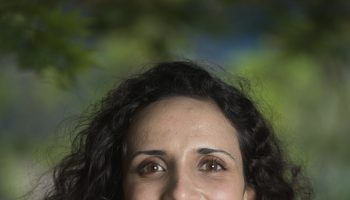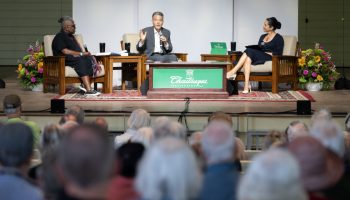
Cody Englander
Staff Writer
America is currently over $36 trillion in debt.
“I wish my wife would let me run our household finances like this,” said economist David K. Young.
At 10:45 a.m. today in the Amphitheater, two of The Conference Board’s leading experts in the economy and economic development, Erin McLaughlin and Young, will discuss the sustainability of capitalism. This lecture opens Chautauqua Lecture Series Week Five’s “Innovation in Capitalism: How to Meet 21st-Century Challenges?”
Young is president of the Committee for Economic Development, the public policy center for The Conference Board, a nonprofit business membership and research organization.
He previously worked as the chief executive officer of Oxford Analytica, focusing on global strategy and business operations. Young graduated from the College of William and Mary with a Bachelor of Arts in government, went on to get a master’s degree in international security from the University of London and received a Master of Business Administration from the McDonough School of Business at Georgetown University.
McLaughlin works as a senior economist at The Conference Board’s Economy, Strategy and Finance Center, focusing on energy, infrastructure and environment research for the center.
Before joining The Conference Board in 2022, she was the vice president of private market resources at the American Council of Engineering Companies, leading initiatives to analyze economic and market activities and policy implications.
The conversation will be moderated by Larry D. Thompson, former U.S. Deputy Attorney General, retired executive vice president for government affairs at PepsiCo, and a member of the Chautauqua Institution Board of Trustees. Their talk will focus primarily on the future of capitalism.
Young described the system as imperfect, but cited it as the best economic environment thus far.
“In terms of capitalism, one, it can’t be taken for granted. Two, it’s not static. Three, it interacts with the environment within which it plays,” said Young.
Modern capitalism is different than when America was founded. According to McLaughlin, economists are still looking for capitalism to benefit the majority, as a K-shaped recovery — when one sector bounces back from a recession while others lag, or continue to delice — takes shape.
“One thing that touches on this is ‘How do we have a society that allows individuals to succeed while having a civic society and community-based program, (like) public transit, that allows us to successfully succeed as a society?’ ” McLaughlin said.
With no perfect answer, it leads to one of the biggest questions modern economists grapple with.
“The biggest challenge of capitalism is how to promote a healthy middle class,” said McLaughlin.
Under President Donald Trump’s administration, many economists are grappling with the influx of executive orders, tarriffs, and tax cuts associated with the Big Beautiful Bill.
“We’ve had the busiest, most active first 100 days of an administration since 1933,” Young said.
He touched on the vast amount of debt the United States government has collected, exceeding $36 trillion, with another budget to be set in about six weeks.
“Since 1977, the U.S. government has passed the budget on time four times,” said Young. “The last time was in 1997.”
With the U.S. debt issue, he wanted to stress that no country can work in isolation.
“The world is incredibly interactive and interconnected,” he said. “The U.S. has a very important pivotal role to play in global society.”
He hopes America is able to work bipartisanly to help create a flourishing capitalist economy to help solve this issue, and McLaughlin agreed.
“Now is certainly an important time to have these important conversations,” said McLaughlin.




